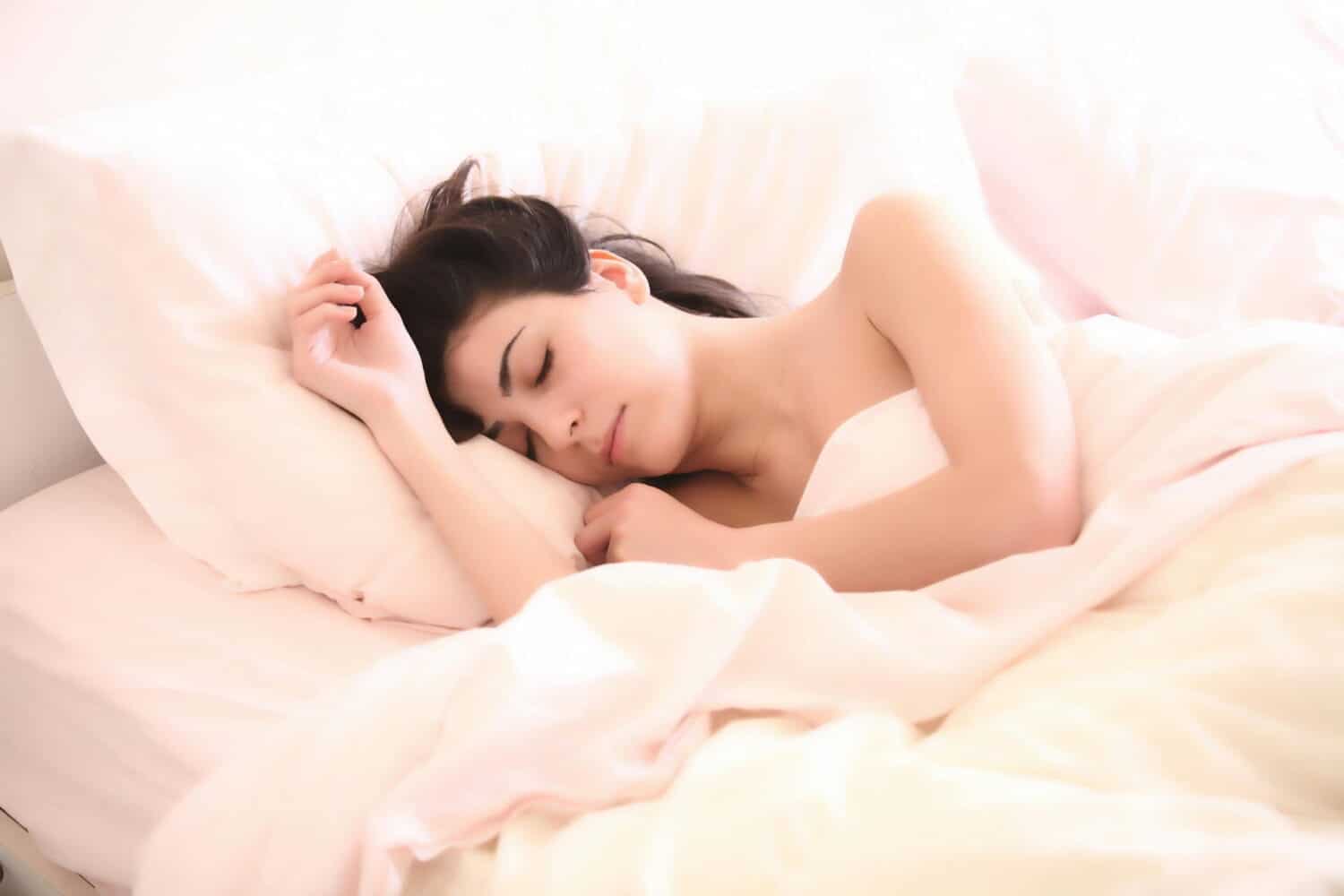Ever heard of acupressure for insomnia? Sleep is one of our basic human needs. It is recommended that adults need between seven and nine hours of sleep per day. When we are unable to get adequate sleep, we quickly notice how it impacts our ability to function well throughout the day. Others around us may also be impacted, whether it’s through our crankiness or clumsiness. When we consistently don’t get enough sleep, our health, both mental and physical, suffers in the long run.
For many people who do not sleep enough, it is not merely an issue of prioritising sleep and following through with discipline. They may set aside the time to sleep and try to do so but find that they just aren’t sleeping well.
Unfortunately, the more people worry about their sleep, the more it seems to elude them. It’s like fighting a silent and frustrating battle against themselves. It becomes stressful when you have tried the commonly advised tips to get a good night’s rest and still can’t do so. Before you give up, there is one more option you can try, which is acupressure for insomnia. This will target the body’s various pressure points to fall asleep. This article will explore this form of acupressure and the benefits you can experience from using it.
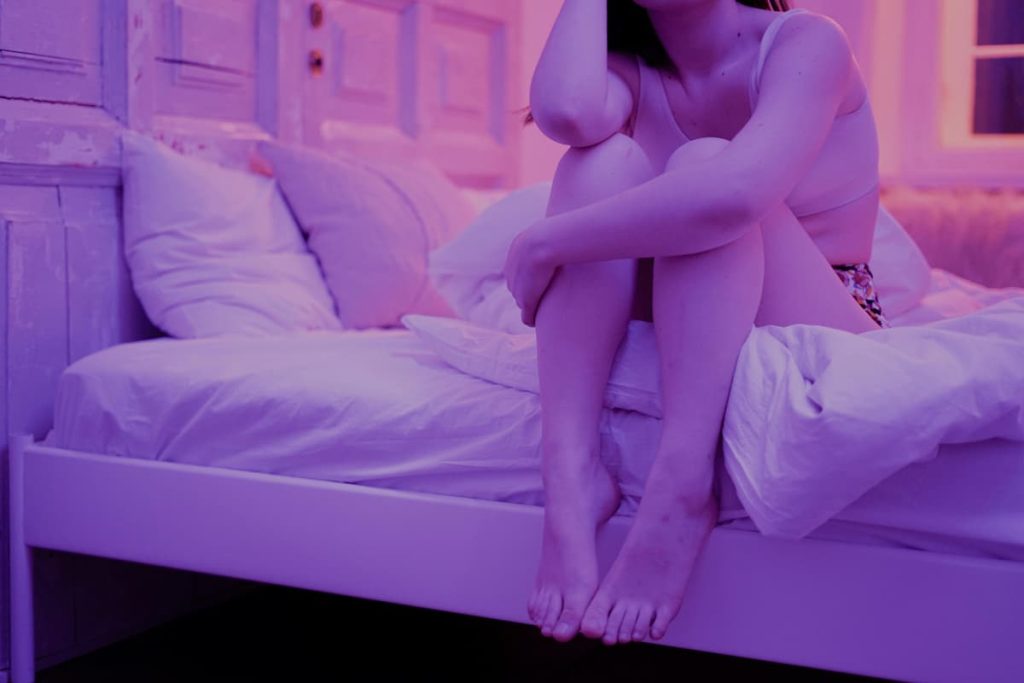
Why Falling Asleep Can Be Hard
There are a whole host of reasons why people may find it hard, or even impossible, to sleep for prolonged periods. Some of these issues include stress, major life changes (such as a baby or bereavement), anxiety, depression, pain, discomfort, illness, or a sleep disorder.
The most common sleep disorder is insomnia, which is defined as difficulty falling or staying asleep. The Canadian Sleep Society estimates that up to 40% of Canadians experience at least one symptom of insomnia at any point. These symptoms include waking up too early and not being able to get back to sleep, sleepiness during the day, fatigue, irritability, difficulty focusing, poor memory, proneness to making errors and worrying about sleep.
For some people, insomnia is short-lived, lasting a couple of days or weeks. It is resolved on its own once the underlying issue is eliminated or managed. For other people, the condition is chronic, which is classified as difficulty falling or staying asleep at least three nights a week for at least three months. About 10% of Canadians experience chronic insomnia, according to the Canadian Sleep Society.
What are Pressure Points?
Acupressure works by targeting pressure points, also referred to as acupoints. Pressure points are thought to correspond to specific organs through pathways known as meridians. Therefore, by stimulating these points, you can facilitate the healing of that organ, system, or process.
Sleep pressure points are the specific locations on one’s body where one applies pressure to treat insomnia. These points can be stimulated through acupuncture or acupressure. There is also some overlap between these pressure points and those used in reflexology.
Can Pressure Points Improve Sleep?
Extensive scientific research is yet to be done to provide robust evidence for each pressure point and for acupressure in general.
However, several studies, along with anecdotal evidence, suggest that pressure points are effective in treating insomnia.
The points correspond to different aspects of falling asleep, such as relaxing the mind, slowing the heart rate, and relieving muscle tension.
6 Types of Pressure Points for Sleep
There are six pressure points around the body that are effective in treating insomnia. The numbers and letters in the names of some of the points correspond to the specific organ and pressure point. When you massage the various pressure points to fall asleep, remember that though your pressure needs to be firm, it should never be to the point where you feel pain or discomfort. It is supposed to be a relaxing experience.
Also, do not use acupressure on a pressure point that is injured, numb, or has had a recent blood clot. Finally, while acupressure is considered a safe treatment, it is a good idea to consult a doctor before undertaking any alternative therapy. This is especially true if you are pregnant.
Before starting:
- Always use firm but comfortable pressure—never painful.
- Skip acupressure if you have an injury, numbness, or a recent blood clot at the site.
- If you’re pregnant or managing a health condition, check with your doctor first
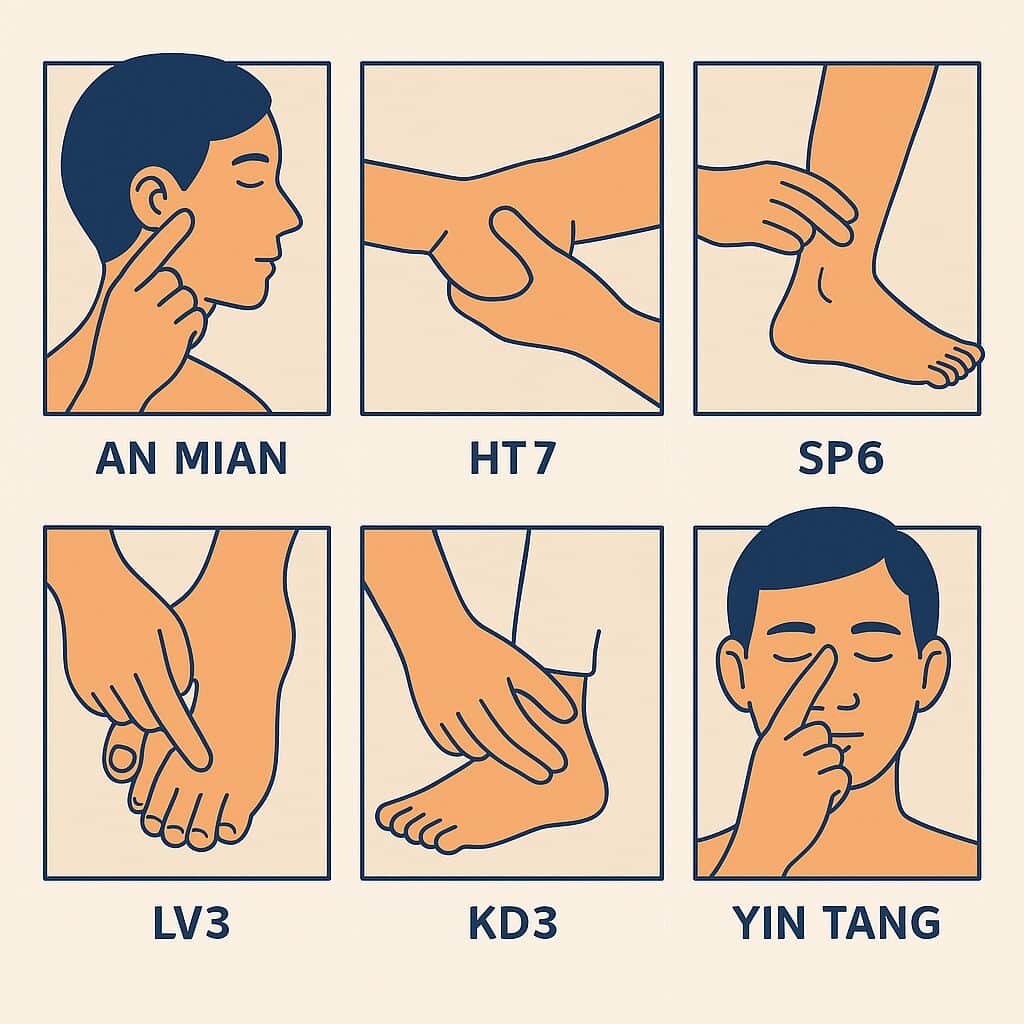
1. An Mian (Peaceful Sleep)
The name of this pressure point for sleep aptly translates to Peaceful Dreams.
Location: Behind the ear, between your earlobe and hairline.
How to Use: Use your thumb or forefinger in gentle, circular motions.
Benefits: Calms the nervous system, lowers heart rate, and supports sleep—especially for stress- or depression-related insomnia.
When to Avoid: If there’s tension or injury near the ear or neck.
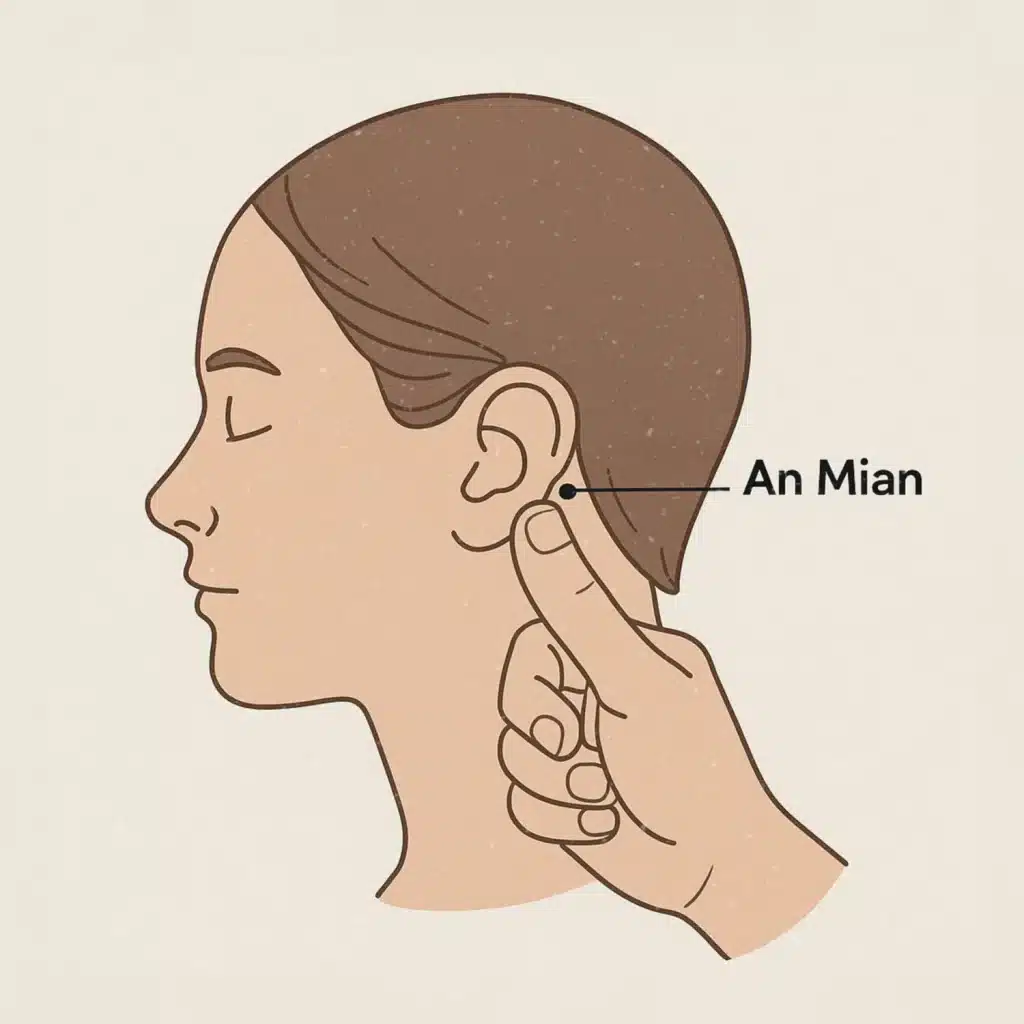
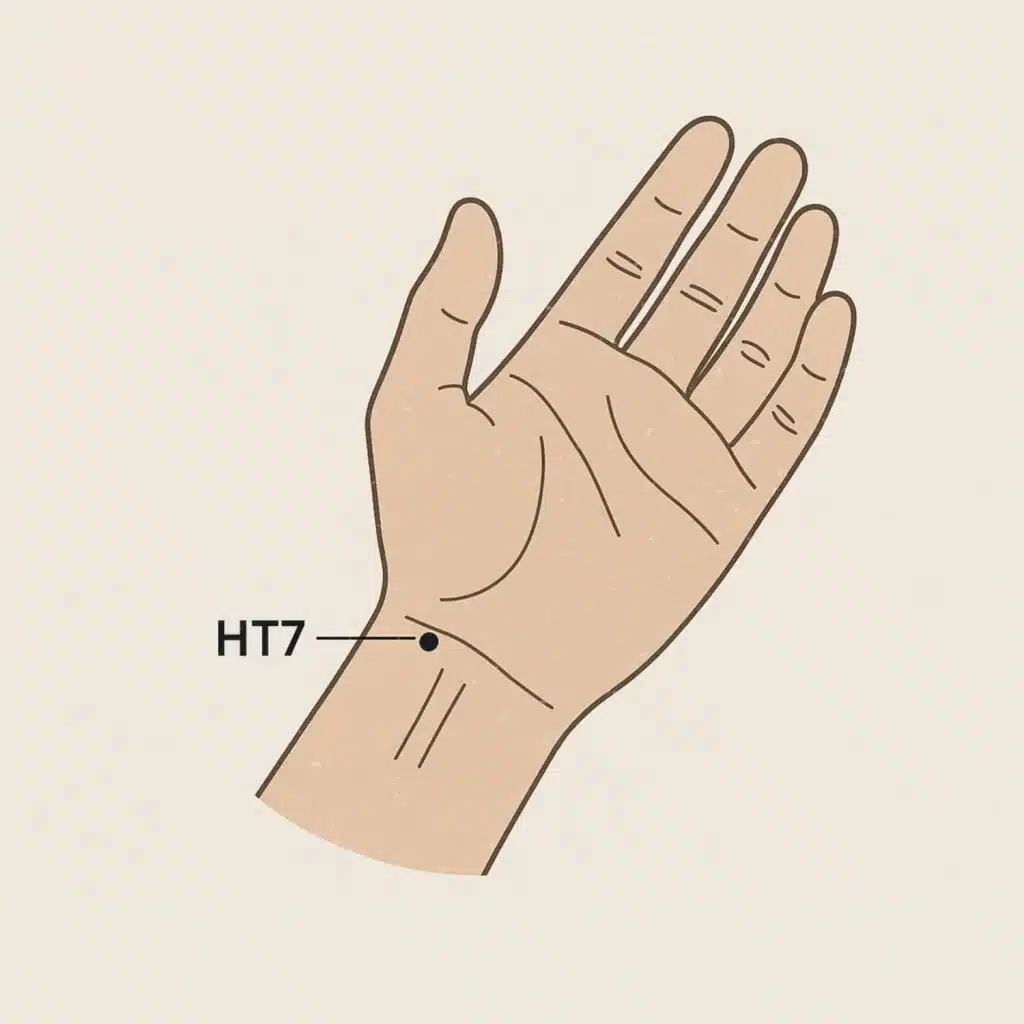
2. 2HT7 (Shen Men or Spirit Gate)
If your mind won’t shut off at night, HT7 might help bring it back to calm. This wrist point is often used to ease emotional restlessness.
When to Avoid: Avoid if the wrist is swollen, strained, or healing from injury.
Location: On the wrist crease, in line with your pinky finger—where there’s a soft hollow between tendons.
How to Use: Massage gently for 2–3 minutes in circles or up-and-down motions. Follow with alternating firm pressure on either side of the point.
Benefits: Helps calm the mind and improve sleep quality. Particularly useful for older adults or those with Alzheimer’s-related sleep issues.
3. SP6 (San Yin Jiao or Three Yin Intersection)
This one’s a go-to for full-body relaxation. SP6 is often used in acupressure and acupuncture for everything from sleep to hormonal balance.
When to Avoid: Do not use this point during pregnancy—it may stimulate labour.
Location: Four finger-widths above the inner ankle bone, between the shin bone and muscle.
How to Use: Apply deep, steady pressure with your thumb or knuckle.
Benefits: Aids in improving overall sleep quality and reducing fatigue—especially helpful for those recovering from illness.
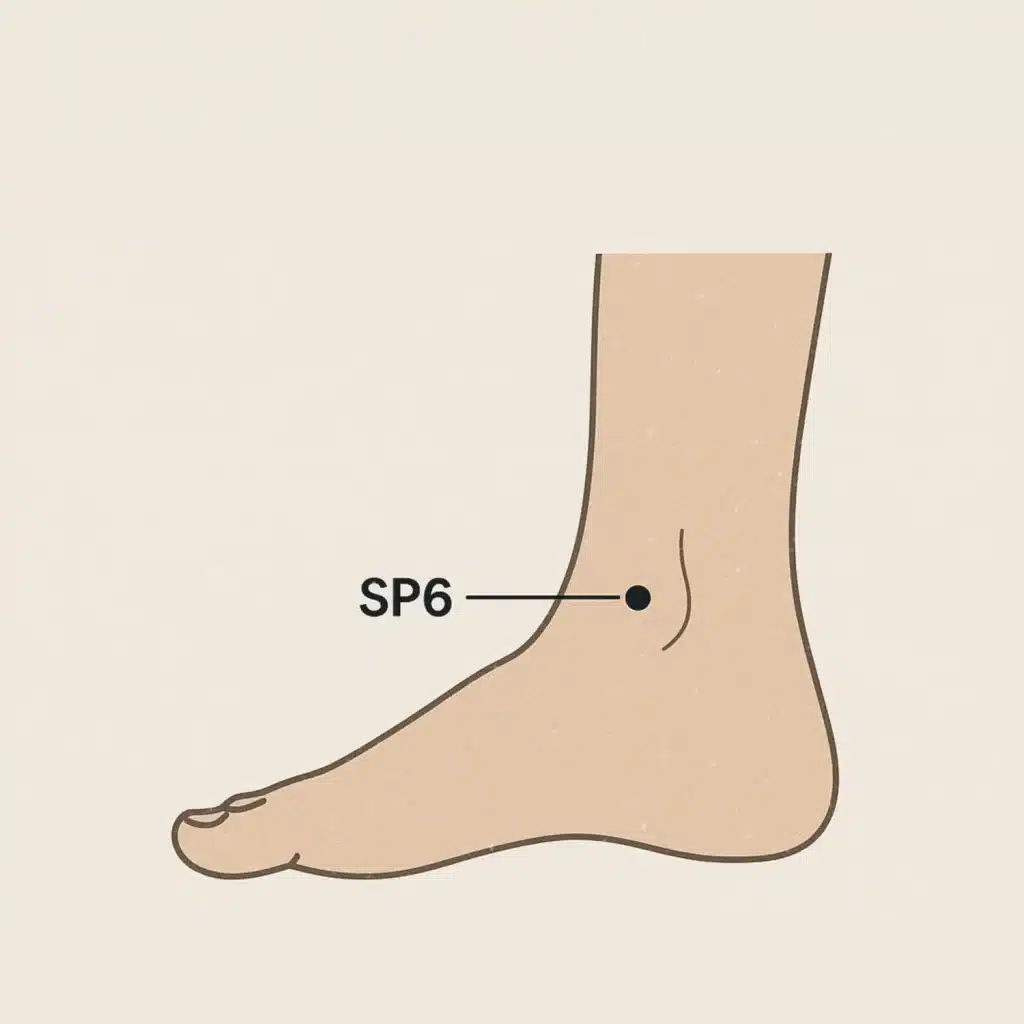
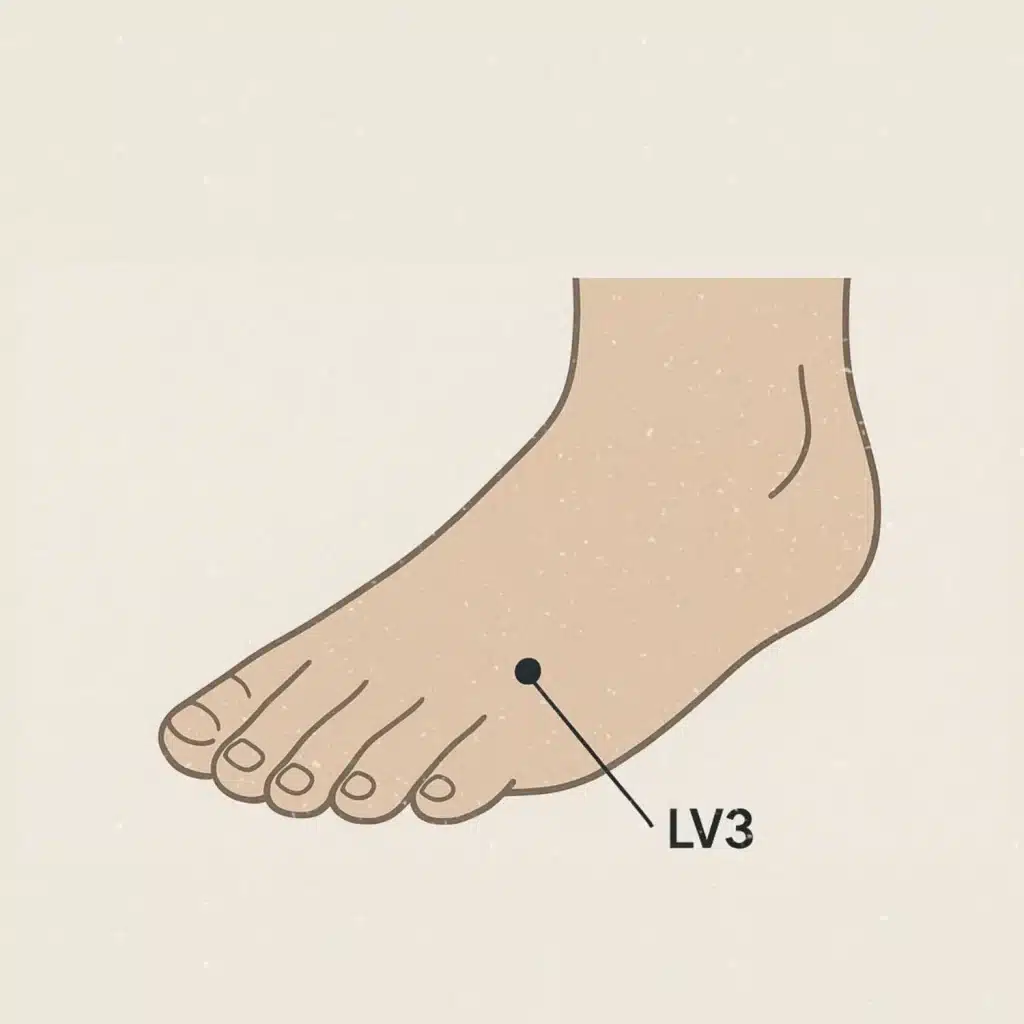
4. LV3 (Tai Chong or Great Surge)
Tension in your mind or body? LV3 helps dial down that racing energy and ease stress that can keep you up at night.
When to Avoid: Avoid if you have foot pain or sensitivity in that area.
Location: On the top of the foot, in the webbing between the big toe and second toe.
How to Use: Press firmly and massage in circles for 1–2 minutes.
Benefits: Calms anxiety, stress, and tension-induced insomnia. Often used when the cause of sleep issues isn’t clear.
5. KD3 (Taixi or Great Ravine)
This ankle point has a grounding effect. It’s often used in routines for people dealing with long-term sleep trouble or tension from hypertension.
When to Avoid: If the area is swollen or bruised.
Location: Inside the ankle, just behind the ankle bone and between the tendons.
How to Use: Apply steady, gentle pressure using your thumb or fingertip.
Benefits: Shown to improve sleep in middle-aged and older adults, especially those with high blood pressure.
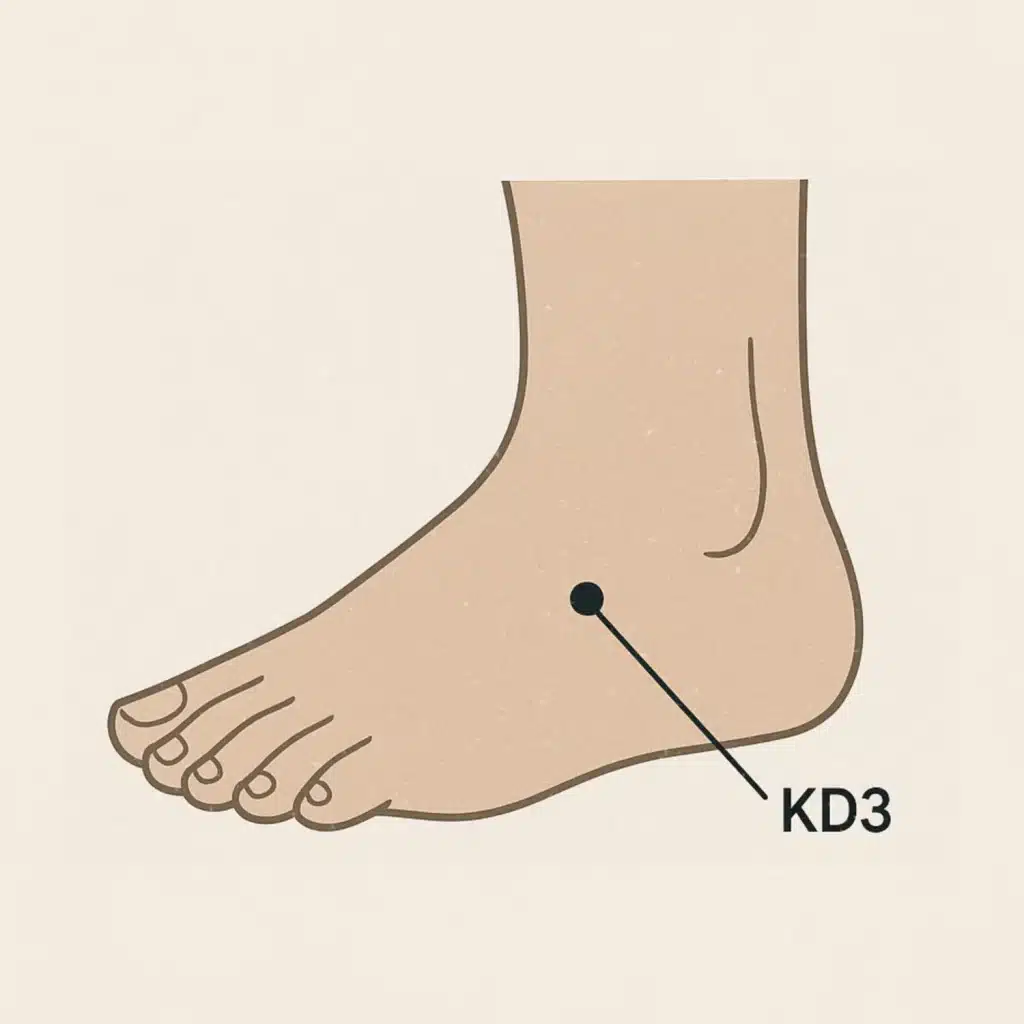
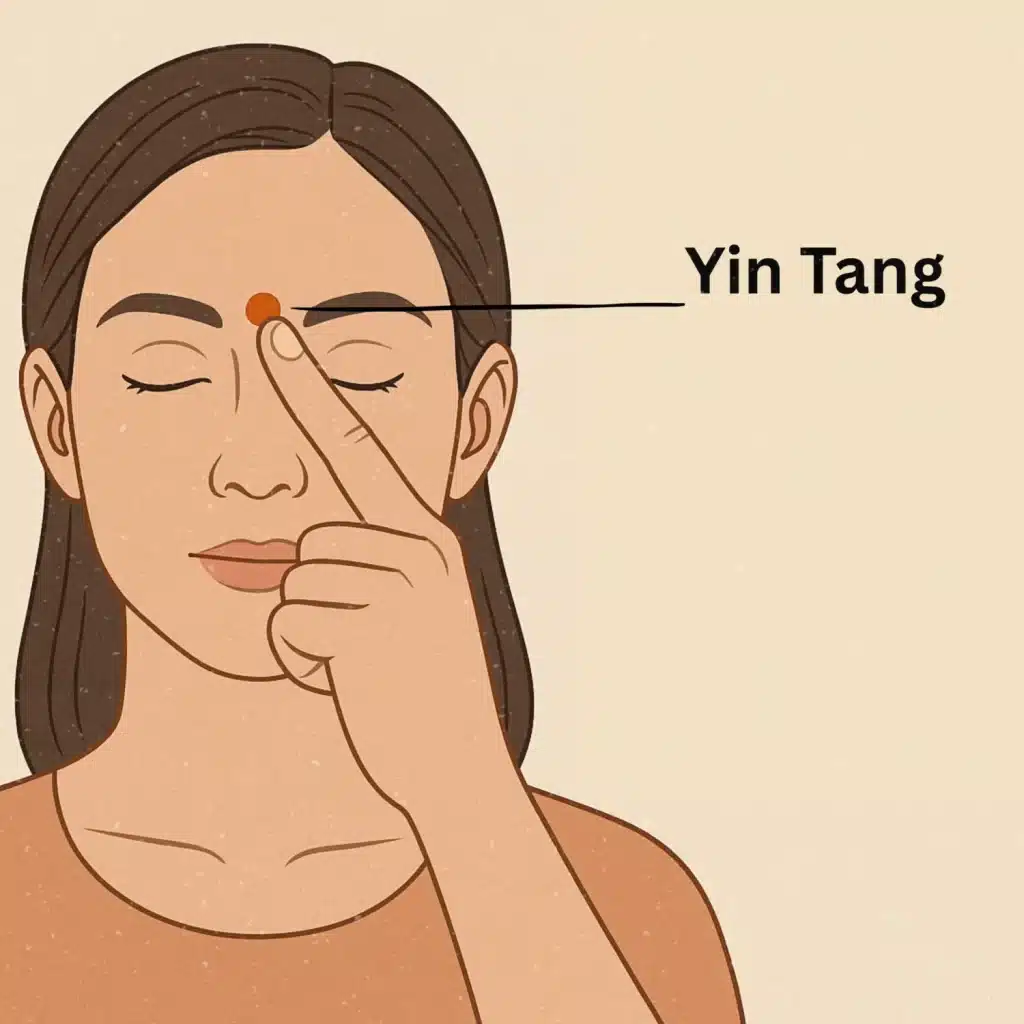
6. Yin Tang (Third Eye or Hall of Impression)
Need to clear your head before bed? Yin Tang is the classic “third eye” spot, used to quiet the mind and calm the body.
When to Avoid: Safe for most unless you have irritation or sensitivity in that area.
Location: Right between the eyebrows, just above the bridge of the nose.
How to Use: Use your index finger or thumb to press lightly for a minute or two.
Benefits: Reduces restlessness, tension headaches, and overthinking—easing you into a more relaxed state for sleep.
How to Use Acupressure for Insomnia?
This can be performed on your own with your finger, thumb, or knuckle. You can even opt for a blunt object or massage tool. Some of the pressure points, such as those around the head and wrists, can be massaged while you are in bed. Others, like those around the ankles and feet, could be massaged as part of your routine as you wind down.
You can also experiment with acupressure at different times leading up to bedtime. Some people prefer doing acupressure in bed, while others find it more beneficial when it’s done even up to an hour before bedtime. It is also helpful to add acupressure to your routine along with other relaxing habits, such as stretching, deep breathing, and limiting screen time, coffee, and alcohol before bed.
Overall, using acupressure can be an easy addition to your self-care routine. You can also ask someone to help you massage the pressure points for you. Another option is to go to an acupressure practitioner or massage therapist.
Related Article: 8 BENEFITS OF ACUPUNCTURE
Who is Best Suited for Acupressure for Insomnia
There are a lot of benefits to acupressure, which are similar to the ones you’d find for acupuncture.
A few studies have been done on specific populations, but many people should try using acupressure to treat insomnia.
Some findings suggest that acupressure is beneficial in treating insomnia that is due to cancer treatment, menopause, anxiety, depression, Alzheimer’s disease, and hypertension without worrying about side effects or drug interactions.
Acupressure is a simple option for anyone to try. It is also safe enough to use on its own or in combination with other insomnia treatments.
Practise acupressure consistently and give it enough time to see if it’s something that is helpful to incorporate into your bedtime routine. There really is nothing to lose by trying it out.
Please remember that some pressure points, such as the SP6 (Three Yin Intersection), are not recommended during pregnancy.
Consult with Professionals for Sleep Pressure Points
Acupressure is a fascinating practice that has helped many people get better sleep at night. While more research needs to be done, what is undeniable is that there is a link between the mind and body. By using acupressure to stimulate various areas of the body, both mind and body can relax enough to fall asleep and stay asleep. Being sleep-deprived is difficult and affects every area of your life. It shouldn’t be a condition you have to live with. You deserve adequate rest, not just to function well from day to day, but also as a self-nurturing investment in your health, both now and in the future.
In addition to acupuncture, Newmarket Health & Wellness Centre offers acupressure services to help treat insomnia. By seeking our professional services, you can be sure that the accurate sleep pressure points are being stimulated. Our relaxing environment helps put you in the ideal sleep time mode. We are also able to assist you with any questions and concerns. Start enjoying a good night’s sleep again with the help of Newmarket Health & Wellness Centre.To get more information or to book an acupressure appointment at one of our centres, feel free to contact us. We’re happy to help you get better sleep.


